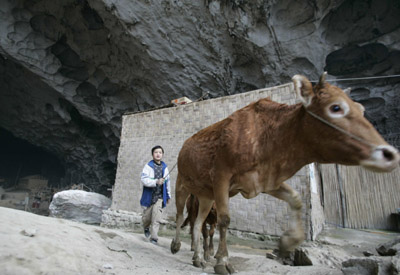China's "last cave dwellers" refuse to leave
(Reuters)Updated: 2007-02-14 09:23
 Wang Qirong leads a cow out of a huge cave at a remote Miao village in Ziyun county, southwest China's Guizhou province February 12, 2007. The village of Zhongdong, which literally means "middle cave", is build in a huge, aircraft hanger-sized natural cave, carved out of a mountain over thousands of years by wind, water and seismic shifts. [Reuters] |
ROOM FOR OPTIMISM
To be sure, life in the village is tough. Villagers say they are lucky to make even 1,000 yuan ($129) per family a year.
Women give birth at home, in houses with dirt floors and wood-fired hearths. The nearest hospital is a five-hour walk away.
But in the last few years life has improved considerably, they say, somewhat optimistically.
Electricity has arrived via wires strung over the mountains, and there is a primary school, which like almost every other building in Zhongdong has no roof. It does not need one as the buildings are deep inside the cave.
Four houses now have televisions, some with DVD players, and some have washing machines. Satellite dishes are perched on outcrops at the cave's entrance and there is even mobile phone reception.
The school has revolutionised life, villagers say. The children happily chat away in clear, unaccented Mandarin, unlike their parents and grandparents who still struggle with China's official language or don't speak it at all.
"When I was younger, we used to have to walk three hours to school, and then three hours to get back home," said Wang Fengguan. "The new school is great."
Adult literacy classes are also held. Progress is marked on the household registration forms pinned outside homes, with the Chinese characters for "has escaped illiteracy" placed next to the names of adults who have attended class.
Daily necessities are still a struggle though. Villagers make the five-hour trek to the county town once a week to buy the things they cannot make or grow, like toothpaste and soap, and to sell their cattle.
Water supplies are limited in the dry season. Buckets are set up around the cave to catch drips.
Residents are building wells into the cave's floor, and are busy concreting them -- a measure, perhaps, of their commitment to stay in their remote home.
 | 1 | 2 | 3 | 4 | 5 | 6 |  |
|
||
|
||
|
|